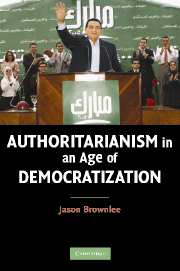Book contents
- Frontmatter
- Contents
- List of Figures and Tables
- Abbreviations and Acronyms
- Acknowledgments
- Introduction: Authoritarianism in an Age of Democratization
- 1 The Political Origins of Durable Authoritarianism
- 2 The Inception of Ruling Parties
- 3 Institutional Legacies and Coalitional Tensions
- 4 Ruling Parties and Regime Persistence
- 5 Elite Defections and Electoral Defeat
- 6 Confrontation and Democratization
- 7 Conclusions
- References
- Index
- References
References
Published online by Cambridge University Press: 05 June 2012
- Frontmatter
- Contents
- List of Figures and Tables
- Abbreviations and Acronyms
- Acknowledgments
- Introduction: Authoritarianism in an Age of Democratization
- 1 The Political Origins of Durable Authoritarianism
- 2 The Inception of Ruling Parties
- 3 Institutional Legacies and Coalitional Tensions
- 4 Ruling Parties and Regime Persistence
- 5 Elite Defections and Electoral Defeat
- 6 Confrontation and Democratization
- 7 Conclusions
- References
- Index
- References
- Type
- Chapter
- Information
- Authoritarianism in an Age of Democratization , pp. 223 - 244Publisher: Cambridge University PressPrint publication year: 2007



